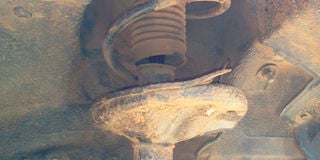Your Ipsum’s suspension needs a thorough mechanical check

Over time, some suspension components such as the shock absorbers need replacement.
Qn: I own a Toyota Ipsum 1998 model but when I am driving, it seems to bend on the front right. I have put new shocks both front and rear but there is no change to this problem. Please advise. Musa.
Ans. Your car suspension works hard as it carries the vehicle weight, dampens vibrations, corrects load carrying systems as well as adjusting the position of the vehicle in motion over varying road surfaces.
Over time, there is wear and tear of all the suspension components besides the shock absorber dampers. In your case, you need to replace your front axle helical springs because they are worn out.
During start/stop or driving motions, the springs undergo both lateral and axial torsional stresses. Over time, their tension reduces and so does their role in supporting the other suspension components.
Ask your mechanic to check and confirm that there is no corrosion on the body panel where the shock absorber mounting is fastened. Occasionally, Toyota Ipsums with corrosion damage will experience a similar problem.
I drive a Toyota Noah 1999 with 2,000cc. I was on the road to Mbarara from Kampala and the check engine light showed up on the dash board. What should I do or how safe is my car to Mbarara?
The “check engine” light on your car switches on when the engine computer detects an engine emission fault. After each engine combustion cycle, the exhaust by-product or emission will have elements of un-burnt fuel, soot and air, in varying quantities depending on the efficiency of the combustion process. Any tendency towards a rich or lean fuel and air mixture is detected in the exhaust pipe by the oxygen sensors which send this information to the engine control unit. This information is used by the computer to regulate the amount of fuel and spark to be delivered.
A failure of the oxygen sensors will make the engine computer erratically deliver the wrong amounts of fuel, which causes multiple cylinder engine misfire and an emission fault. Your fuel consumption will also increase.
You can buy new replacement oxygen sensors from a Toyota dealer. It is safe to drive to Mbarara and back, though the journey would cost you a lot more fuel than usual. Replace the oxygen sensors as soon as you return to avoid damage of spark plugs.
Can I alternately use both unleaded and Shell V Power fuel for a Mercedes S500 or will it damage the engine?
Shell V Power fuel is unleaded but with a higher octane rating ranging between 95 and 98 as it varies across different markets. Octane is a flammable hydrocarbon liquid that along with other hydrocarbons such as pentane, hexane, heptane, and many others is refined from crude oil and make up the blend of chemical components called petrol. Octane is also a measure of a fuel’s tendency to knock or ping when it is mixed with air and burned in the cylinder of an engine. This octane rating is not based on the amount of chemical octane in the gasoline.
The rating is called octane because the gasoline’s ability to prevent engine cylinder knock has been rated against the performance of pure hydrocarbon octane, which has a rating of 100. Petrol, may have a higher or lower rating, depending on how its anti-knock performance compared to the performance of pure hydro carbon octane. Petrol with higher octane rating burns slower than low octane petrol.
The slow burn prevents engine knock when cylinder pressures are high and protects the engine from negative effects of premature combustion. This is useful in bigger V shaped engines like your S500.
However, these benefits will not be experienced by owners of smaller engines, which should use petrol with the lower octane rating. All vehicle manufacturers often recommend a specific fuel octane rating (RON). If you check your Mercedes user manual it will indicate the correct RON for your engine. Ordinary straight four petrol and diesel engines take fuel with lower octane ratings between 87-94, depending on manufacturer’s specifications.
It should be noted that modern vehicle engines, like your Mercedes S500 are fitted with sensors to detect and reduce cylinder knock.
With this feature, the alternate use of unleaded petrol with low octane rating, from any dealer, may not cause any harm as the resultant cylinder knock will be mitigated by the system.
I own a Range Rover Sport-2006 with about 120,000kms on the clock. Lately, I have been experiencing a rattling noise in the front suspension when I drive on corrugated gravel roads or over humps on a road at low speeds. My mechanic has suggested that we may have to replace the air suspension shock absorbers only available at the Land Rover dealership. What is your advice? Robert.
Your Range Rover Sport has about 120,000kms on the clock. At that mileage, wear and tear of suspension parts is expected. Your mechanic is pointing in the right direction. However, I would not quickly jump to the conclusion that the front air dampers (shock absorbers) are worn out before a thorough inspection.
Range Rover Sport front suspension has different components that usually wear out after 100,000kms of hard driving on corrugated roads with pot holes.
They should be dismantled and inspected before deciding which ones need to be replaced. These include the left and right axle upper and lower control arms, which have bushes and ball joints, ball joints in the lower part of the hub assembly, link bars as well as stabiliser bar bushes.
A failure of any or all of these components will most likely cause the rattle you have described. Range Rover air damper failure usually happens when they develop an air leak. In that event they just collapse and will not inflate.
That is not common but can happen as a result of harsh driving in extreme off-road conditions or wear and tear. While inspecting your front suspension, it might be a good idea to inspect the rear suspension, replace vital fluids such as automatic gearbox oil (with suitable fully synthetic transmission fluid, filter and pan gasket), radiator coolant as well as differential oil. Renew the engine air filter, cabin air conditioning filter and fuel filter. You need a specialist Land Rover technician to carry out these procedures. Consider checking and replacing the long life spark plugs if they have not been replaced before.




